Journey begins
So what do you do when you need some talented people break down some code. Asking would be a bit easy right ? So of course you set up a neat little platform and make a game out of it. Which brings us to Decompetition v2.0, lets welcome our new challenge. This CTF is focused around reverse engineering with different programm languages as a base and a direct exchange between the target source binary and your own code via dissambled outputs. Cause we have no clue also no fear to dive in.
Baby_c
; This is the disassembly you're trying to reproduce.
; It uses Intel syntax (mov dst, src).
main:
endbr64
push rbp
mov rbp, rsp
push rbx
sub rsp, 0x18
mov [rbp-0x15], 1
block1:
mov rax, [stdin]
mov rdi, rax
call getc@plt.sec
mov [rbp-0x14], eax
cmp [rbp-0x14], -1
je block7
block2:
call __ctype_b_loc@plt.sec
mov rax, [rax]
mov edx, [rbp-0x14]
movsxd rdx, edx
add rdx, rdx
add rax, rdx
movzx eax, [rax]
movzx eax, ax
and eax, 0x2000
test eax, eax
je block4
block3:
mov rdx, [stdout]
mov eax, [rbp-0x14]
mov rsi, rdx
mov edi, eax
call putc@plt.sec
mov [rbp-0x15], 1
jmp block1
block4:
cmp [rbp-0x15], 0
je block6
block5:
mov rbx, [stdout]
mov eax, [rbp-0x14]
mov edi, eax
call toupper@plt.sec
mov rsi, rbx
mov edi, eax
call putc@plt.sec
mov [rbp-0x15], 0
jmp block1
block6:
mov rbx, [stdout]
mov eax, [rbp-0x14]
mov edi, eax
call tolower@plt.sec
mov rsi, rbx
mov edi, eax
call putc@plt.sec
jmp block1
block7:
mov eax, 0
add rsp, 0x18
pop rbx
pop rbp
ret
We started with the probably “easy” C challenge base on the name. Our plan was to
- Figure out what the binary does
- Figure out what the different assemble statements would be in conjunction to the behaviour do
- Figure out how to programm in C
Based on the tip of the maker we uplouded the binary to binary ninja and realized why to stop there. So we went ahead and also used ghidra and ida. Which showed us already interesting outputs.
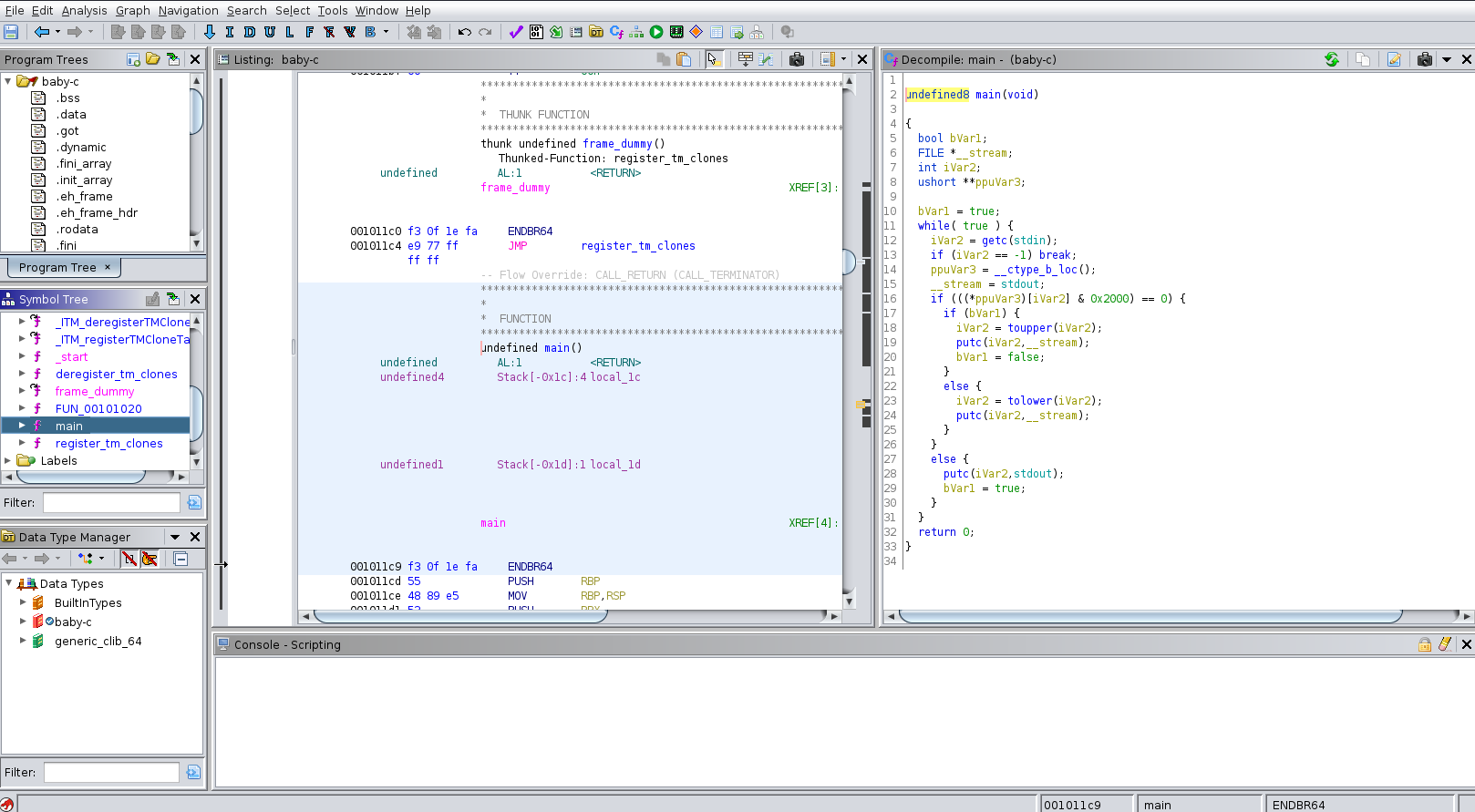
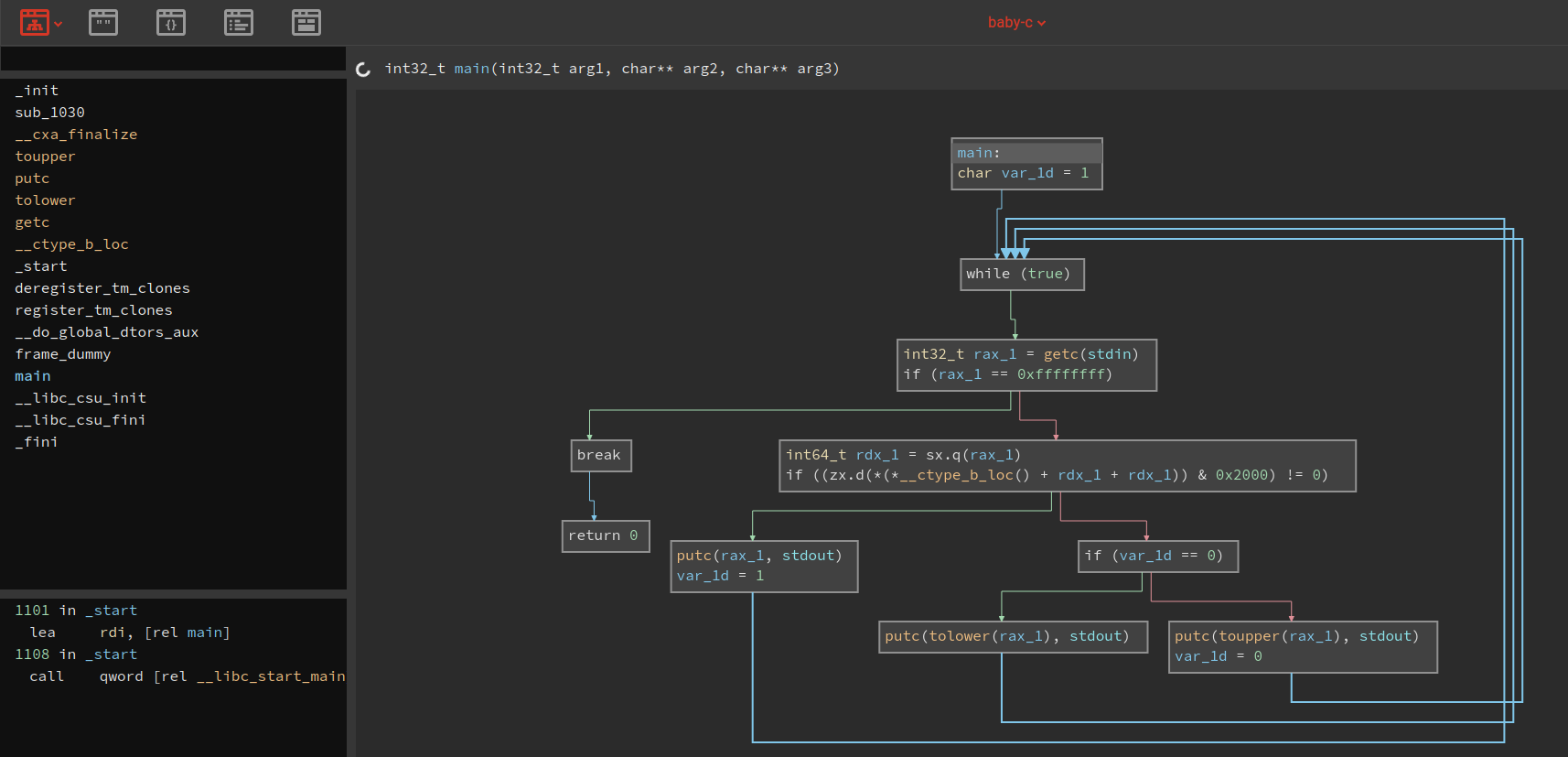
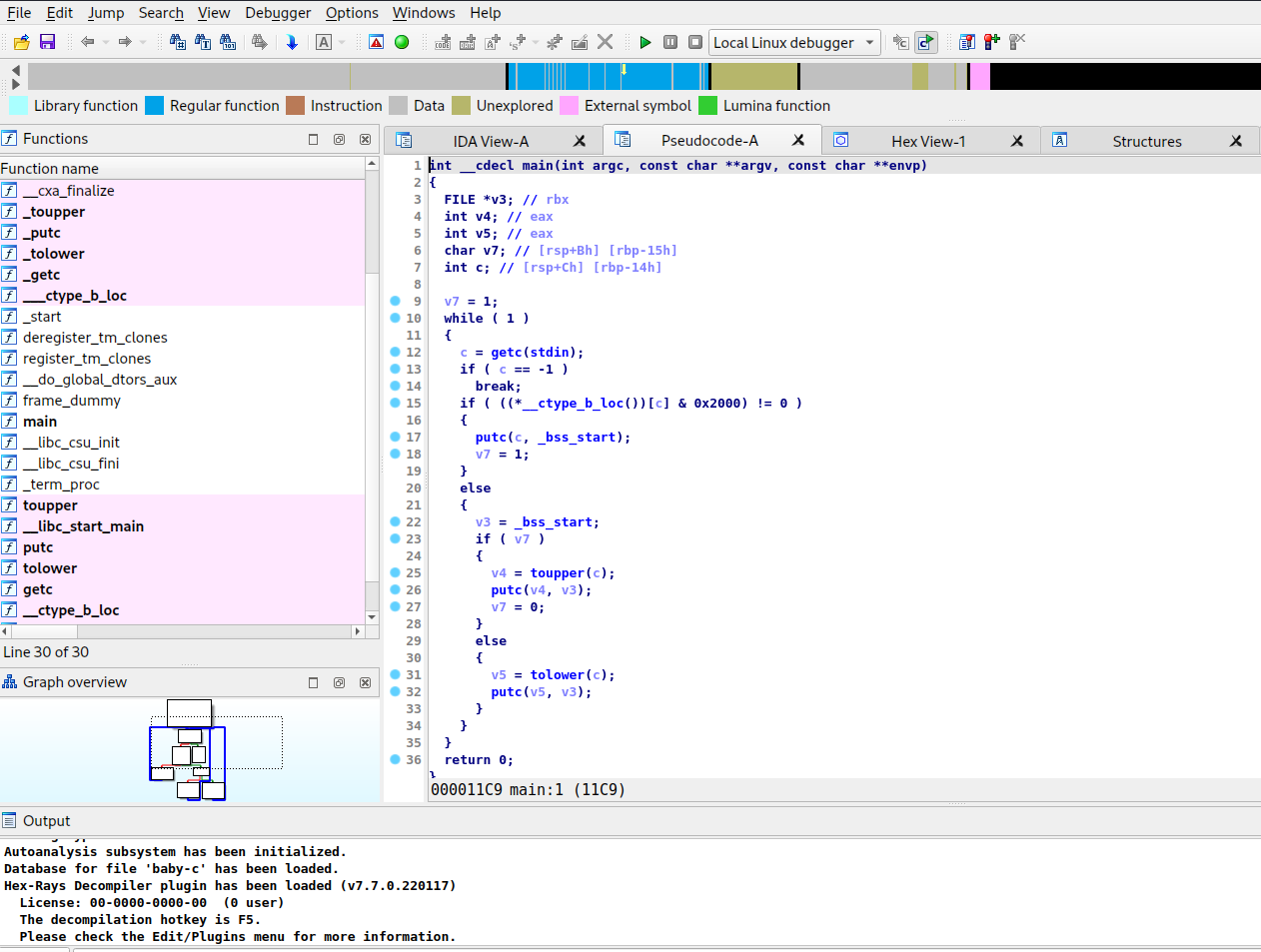
As you can see we have slightly 3 different versions when we use the decompiler of each tool. You know what they say more tools = more fun. But back to our plan what does the programm do ? Based on the outputs we have at the start a variable which is set to 1 and an endless loop until the the break signal is sent to the binary, we think. Next observation is that we have a check on __ctype_b_loc() with the value 0x2000 and if that is true it writes out the input it took to stdout or the console. If that is false depending on the first variable it either uses toupper on the input or tolower and set the original variable to 0. Cause we were not sure if we should uses imports or not, cause they were already given as the starter code, we decided to use the ida output as base cause it did not need any additional imports:
#include <ctype.h>
#include <stdio.h>
int __cdecl main(int argc, const char **argv, const char **envp)
{
FILE *v3; // rbx
int v4; // eax
int v5; // eax
char v7; // [rsp+Bh] [rbp-15h]
int c; // [rsp+Ch] [rbp-14h]
v7 = 1; // counter variable
while ( 1 )
{
c = getc(stdin);
if ( c == -1 )
break;
if ( ((*__ctype_b_loc())[c] & 0x2000) != 0 ) //no clue what that is
{
putc(c, _bss_start); // based on google search and the other decompiler _bss_start in this case == stdout
v7 = 1;
}
else
{
v3 = _bss_start;
if ( v7 )
{
v4 = toupper(c);
putc(v4, v3);
v7 = 0;
}
else
{
v5 = tolower(c);
putc(v5, v3);
}
}
}
return 0;
}
So after that we were sure its not malicious code so we also just ran the code in our VM and did a little black box testing. Cause some parts were still unclear for us. After that we saw that whatever input we give if the first character is from an alphabet and its lower case the output would have an upper case and all other characters would be just printed out and if its from an alphabet it would be lower case. So for example:
└─$ ./baby-c
hello
Hello
WORLD
World
123bs
123bs
bs123
Bs123
empir0x65
Empir0x65
Disclaimer: Never execute something you don’t know or trust. We are usually just stupid and execute everything from CTFs
- Figure out what the binary does
We were now confident that we know what the programm does so lets dive in and see what we can achive with the nice outputs our dicompilers. The first thing we did was some clean up of the original code to make it more readable for us, with some comments for you:
#include <ctype.h>
#include <stdio.h>
int main() //int __cdecl main(int argc, const char **argv, const char **envp) no clue why it was there but we don't need any input to start the programm
{
// FILE *v3; // rbx again no clue why its heres based on the ghidra output for the decompiler the stdout stream is some kind of bit stream which can be declared this way in C we think
// int v4; // eax not used after clean up
// int v5; // eax not used after clean up
char runtime_counter; // char v7; // [rsp+Bh] [rbp-15h] renamed to understand the code better
int input_output; // int c; // [rsp+Ch] [rbp-14h] same here
runtime_counter = 1; // counter variable
while ( 1 )
{
input_output = getc(stdin);
if ( input_output == -1 )
break;
if ( isalpha(input_output) == 0 ) // based on our understanding this would be the check for the character of the input if its part of an alphabet
{
putc(input_output, stdout); // _bss_start replaced with stdout
runtime_counter = 1;
}
else
{
if ( runtime_counter )
{
putc(toupper(input_output), stdout); // made it a one liner to kick out v4 and v5
runtime_counter = 0;
}
else
{
putc(tolower(input_output), stdout); // made it a one liner to kick out v4 and v5
}
}
}
return 0;
}
With this code we were already quite near to the searched original code or one of its variations. Only the isalpha check was wrong. Instead of a JNE instruction we had a JE. Also we relaized that our code always make the first character of the input uppercase regardless of its position. So probably ((*__ctype_b_loc())[c] & 0x2000) != 0 is the culprit. Based on some googling we found out that
- 0x2000 is a check if the char is big or small == 0x2000 2 == is a alphabet char and any of the 0 are for upper 1 would be lower stackoverflow
-
!= 0 check if true or false 0 means false stackoverflow Not sure if the first observations is right or wrong but it make sense that it is a lookup on a given list. And based on the second finding and this nice instructions manual intel we found on page 1000 whatever that JE and JNE in this context means that we would need a check if something is not equal instead of if something is equal.
- Figure out what the different assemble statements would be in conjunction to the behaviour do
We did it Jonny.
So for testing we did exchanged the isalpha with isdigit but it check 800 instead of 2000 of that list. Until now we have no clue what (*__ctype_b_loc())[c] & 0x2000) was originally the right function but when we just use this we have a 100% Solution:
#include <ctype.h>
#include <stdio.h>
int main() {
// glhf
char runtime_counter; // [rsp+Bh] [rbp-15h]
int input_output; // [rsp+Ch] [rbp-14h]
runtime_counter = 1;
while ( 1 )
{
input_output = getc(stdin);
if ( input_output == -1 )
break;
if ( ((*__ctype_b_loc())[input_output] & 0x2000) != 0 ) //isalpha(input_output) == 0
{
putc(input_output, stdout);
runtime_counter = 1;
}
else
{
if ( runtime_counter )
{
putc(toupper(input_output), stdout);
runtime_counter = 0;
}
else
{
putc(tolower(input_output), stdout);
}
}
}
return 0;
}
Also we saw that with that implementation it also worked for us if the second character is from an alphabet it would not be made to upper case. So no clue what is difference but you cant argue with that

We did not managed to do the last point on the list
- Figure out how to programm in C
But at least we got something which was more than we expected and with this little story we might help a student to understand the pleps a bit better.
Baby_rust
; This is the disassembly you're trying to reproduce.
; It uses Intel syntax (mov dst, src).
_ZN6source4mainE:
sub rsp, 0x108
mov [rsp+0xf6], 0
mov [rsp+0xf7], 0
lea rdi, [rsp+0x40]
call [mem1]
lea rdi, [rsp+0x28]
lea rsi, [rsp+0x40]
mov edx, 1
call _ZN4core4iter6traits8iterator8Iterator3nthE
jmp block1
block1:
mov [rsp+0xf7], 1
lea rsi, [mem2]; "what Someu128Zeromut <= t..."
lea rdi, [rsp+0x60]
mov edx, 4
call _ZN47_$LT$str$u20$as$u20$alloc..string..ToString$GT$9to_stringE
jmp block2
block2:
mov [rsp+0xf7], 0
lea rdi, [rsp+0x10]
lea rsi, [rsp+0x28]
lea rdx, [rsp+0x60]
call _ZN4core6option15Option$LT$T$GT$9unwrap_orE
jmp block3
block3:
mov [rsp+0xf6], 1
mov [rsp+0xf7], 0
lea rdi, [rsp+0x40]
call _ZN4core3ptr35drop_in_place$LT$std..env..Args$GT$E
jmp block4
block4:
mov [rsp+0xf6], 0
mov rcx, [rsp+0x20]
mov [rsp+0xa0], rcx
movups xmm0, [rsp+0x10]
movaps [rsp+0x90], xmm0
lea rdi, [rsp+0x78]
lea rsi, [rsp+0x90]
call _ZN6source4stepE
jmp block5
block5:
lea rax, [rsp+0x78]
mov [rsp+0xe8], rax
mov rdi, [rsp+0xe8]
lea rsi, [_ZN60_$LT$alloc..string..String$u20$as$u20$core..fmt..Display$GT$3fmtE]
call _ZN4core3fmt10ArgumentV13newE
mov rcx, rax
mov rsi, rdx
mov [rsp], rsi
mov [rsp+8], rcx
jmp block6
block6:
mov rcx, [rsp]
mov rdx, [rsp+8]
mov [rsp+0xd8], rdx
mov [rsp+0xe0], rcx
lea rsi, [mem3]
lea rdi, [rsp+0xa8]
mov edx, 2
lea rcx, [rsp+0xd8]
mov r8d, 1
call _ZN4core3fmt9Arguments6new_v1E
jmp block7
block7:
mov rcx, [mem4]
lea rdi, [rsp+0xa8]
call rcx
jmp block8
block8:
lea rdi, [rsp+0x78]
call _ZN4core3ptr42drop_in_place$LT$alloc..string..String$GT$E
jmp block9
block9:
mov [rsp+0xf6], 0
add rsp, 0x108
ret
block10:
lea rdi, [rsp+0x78]
call _ZN4core3ptr42drop_in_place$LT$alloc..string..String$GT$E
jmp block14
block11:
lea rdi, [rsp+0x40]
call _ZN4core3ptr35drop_in_place$LT$std..env..Args$GT$E
block12:
mov rdi, [rsp+0xf8]
call _Unwind_Resume@plt
ud2
block13:
lea rdi, [rsp+0x10]
call _ZN4core3ptr42drop_in_place$LT$alloc..string..String$GT$E
jmp block12
block14:
test [rsp+0xf6], 1
jne block13
block15:
jmp block12
block16:
lea rdi, [rsp+0x28]
call _ZN4core3ptr70drop_in_place$LT$core..option..Option$LT$alloc..string..String$GT$$GT$E
jmp block11
block17:
test [rsp+0xf7], 1
jne block16
block18:
jmp block11
block19:
mov rcx, rax
mov eax, edx
mov [rsp+0xf8], rcx
mov [rsp+0x100], eax
jmp block11
block20:
mov rcx, rax
mov eax, edx
mov [rsp+0xf8], rcx
mov [rsp+0x100], eax
jmp block17
block21:
mov rcx, rax
mov eax, edx
mov [rsp+0xf8], rcx
mov [rsp+0x100], eax
jmp block14
block22:
mov rcx, rax
mov eax, edx
mov [rsp+0xf8], rcx
mov [rsp+0x100], eax
jmp block10
block23:
int3
The next challenge we tried was the rust one. Btw. this time you needed to do multiple functions, we posted only main. Rust seems to be not the best language to start for reversing. So we loaded the binary again up in the different tools and got really weird outputs, at least for us.
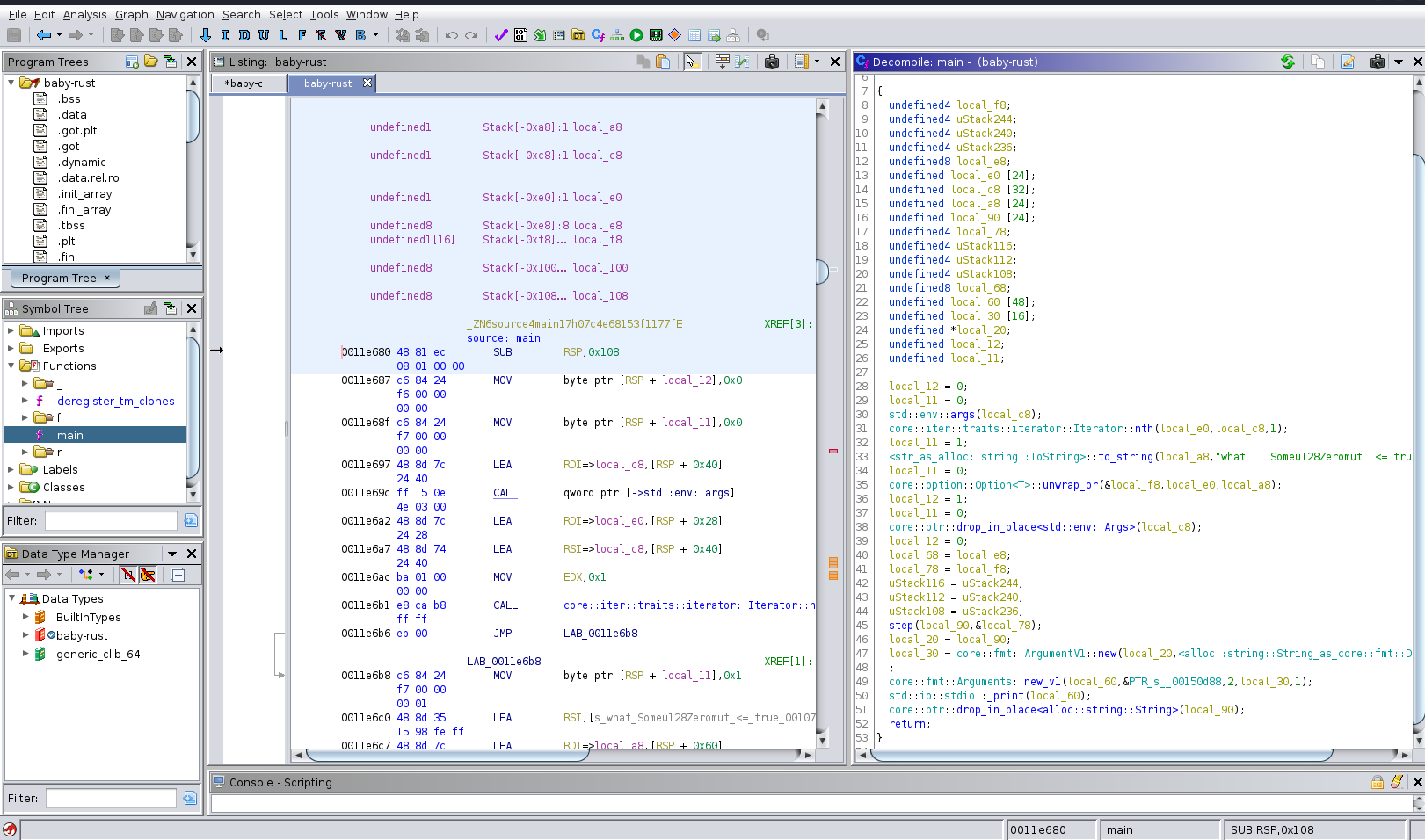
Based on the result we concluded the following:
- Calls like this core::ptr::drop_in_place<std::env::Args>(local_c8); means that from the library core which has library ptr has function drop_in_place is loaded
- The disassemble did not helped cause we rarely touched rust in the past and you should have a basic understanding of the compiler for this
- Ohh and we have multiple functions to create ;-)
- We still don’t have a clue if this programm is safe or not sooo dynamic analysis was not an option Disclaimer: Never execute something you don’t know or trust.
So from what we recalled back then and the first assemble statements
mov [rsp+0xf6], 0 mov [rsp+0xf7], 0
2 variables should be there with value 0 and we have to have a function called step based on the dropdown menu of the webside. So we came to the clever idea to sneak at least something by doing this:
// this is a dummy function to get something
fn step(lhs: u32, rhs: u32) -> () {
if lhs == 0 {
println!("fizzbuzz");
} else {
println!("{}", rhs);
}
}
fn main() {
// Wait a minute, why are you walking backwards?
let integer_1 = 0; // the two variables we need
let integer_2 = 0;
step(integer_1, integer_2); // the function call
println!("{}", integer_1); // rust has a clever compiler so we needed to use the integer variables other wise it would be skipped
println!("{}", integer_2);
}
With this we actually got 2% so better than nothing. Wuup Wuup. But yeah better check other Write ups for a complete solution.
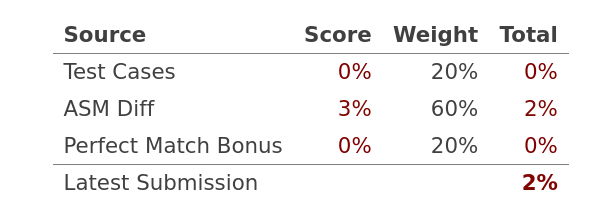
Blaise
; This is the disassembly you're trying to reproduce.
; It uses Intel syntax (mov dst, src).
main:
endbr64
push rbp
mov rbp, rsp
sub rsp, 0x40
mov [rbp-0x34], edi
mov [rbp-0x40], rsi
mov [rbp-0x30], 0
mov [rbp-0x28], -1
cmp [rbp-0x34], 3
jne block2
block1:
mov rax, [rbp-0x40]
add rax, 8
mov rax, [rax]
mov rdi, rax
call atoll@plt.sec
mov [rbp-0x30], rax
mov rax, [rbp-0x40]
add rax, 0x10
mov rax, [rax]
mov rdi, rax
call atoll@plt.sec
mov [rbp-0x28], rax
jmp block4
block2:
cmp [rbp-0x34], 2
jne block4
block3:
mov rax, [rbp-0x40]
add rax, 8
mov rax, [rax]
mov rdi, rax
call atoll@plt.sec
mov [rbp-0x28], rax
block4:
cmp [rbp-0x30], 0
js block7
block5:
cmp [rbp-0x28], 0
js block7
block6:
mov rax, [rbp-0x30]
cmp rax, [rbp-0x28]
jle block8
block7:
lea rsi, [mem1]; "USAGE: ./blaise (range)"
lea rdi, [_ZSt4cerr]
call _ZStlsISt11char_traitsIcEERSt13basic_ostreamIcT_ES5_PKc@plt.sec
mov rdx, rax
mov rax, [_ZSt4endlIcSt11char_traitsIcEERSt13basic_ostreamIT_T0_ES6_]
mov rsi, rax
mov rdi, rdx
call _ZNSolsEPFRSoS_E@plt.sec
mov edi, 1
call exit@plt.sec
block8:
mov rax, [rbp-0x30]
mov [rbp-0x20], rax
block9:
mov rax, [rbp-0x20]
cmp rax, [rbp-0x28]
jg block14
block10:
mov [rbp-0x18], 1
mov rax, [rbp-0x20]
mov [rbp-0x10], rax
mov [rbp-8], 1
block11:
cmp [rbp-0x10], 0
je block13
block12:
mov rax, [rbp-0x18]
mov rsi, rax
lea rdi, [_ZSt4cout]
call _ZNSolsEl@plt.sec
mov esi, 9
mov rdi, rax
call _ZStlsISt11char_traitsIcEERSt13basic_ostreamIcT_ES5_c@plt.sec
mov rax, [rbp-0x18]
imul rax, [rbp-0x10]
mov [rbp-0x18], rax
mov rax, [rbp-0x18]
cqo
idiv [rbp-8]
mov [rbp-0x18], rax
sub [rbp-0x10], 1
add [rbp-8], 1
jmp block11
block13:
mov esi, 1
lea rdi, [_ZSt4cout]
call _ZNSolsEi@plt.sec
mov rdx, rax
mov rax, [_ZSt4endlIcSt11char_traitsIcEERSt13basic_ostreamIT_T0_ES6_]
mov rsi, rax
mov rdi, rdx
call _ZNSolsEPFRSoS_E@plt.sec
add [rbp-0x20], 1
jmp block9
block14:
mov eax, 0
leave
ret
Cause we have no clue about C++ either, we thougt why not. So we started with the same plan as before
- Figure out what the binary does
- Figure out what the different assemble statements would be in conjunction to the behaviour do
- Figure out how to programm in C++
So we got again our neat little decompiler graph as an example from binary ninja.
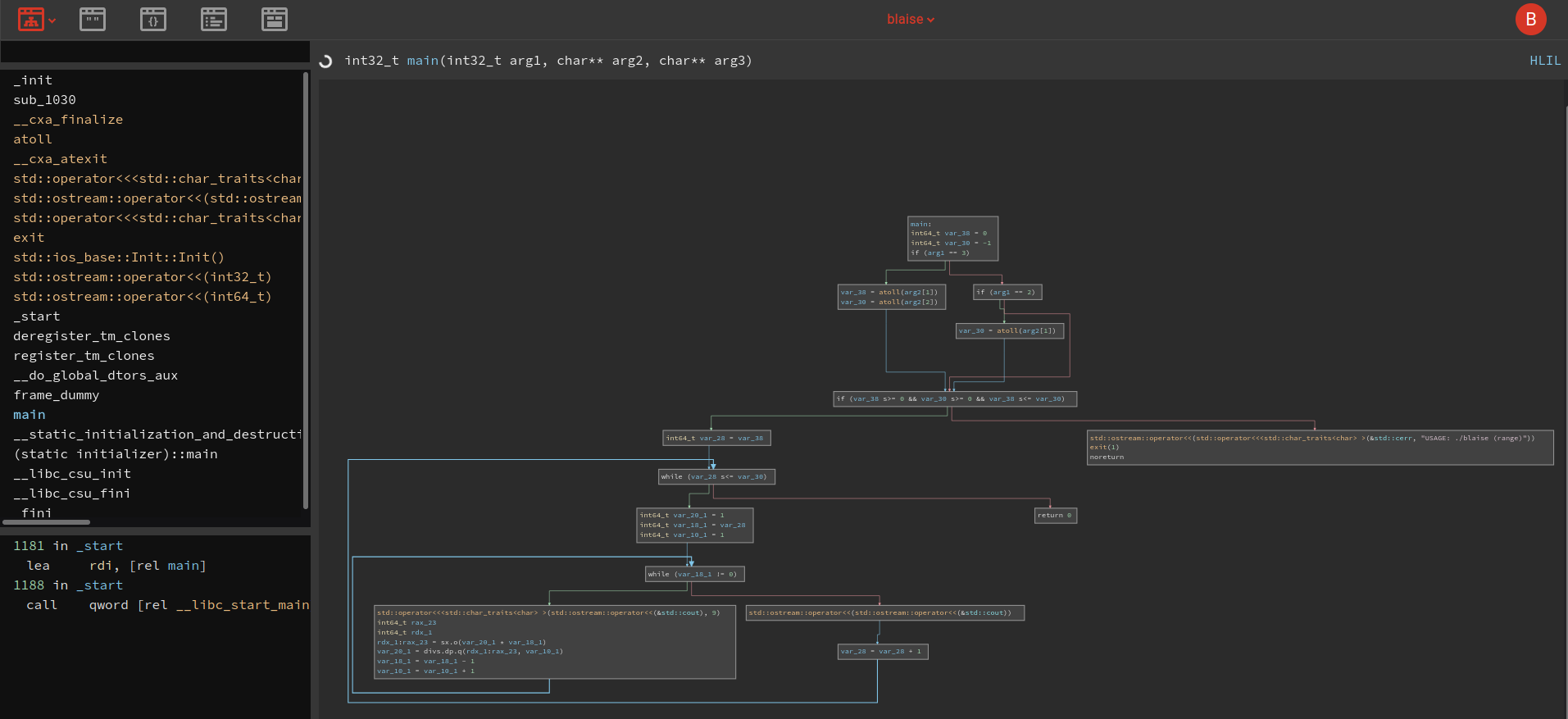
As you can see we have multiple paths within the program. In the first part you can see that we have several checks for the input and an error message if the input is invalid. After that we could see that we had a while loop depending on the range you give as an input. Tough for us to see what happens in detail, but we were certain that we had again non malicous code. So we could jump into the dynamic analysis, by executing the binary.
└─$ ./blaise 0 3
1
1 1
1 2 1
1 3 3 1
As an example valid output you can see that we have the mathematical/schematic tree where the branch below is the sum of the 2 above points in the graph. Google is your friend when you want to know more.
- Figure out what the binary does
Yes we also figured out the error message. So once we had that we started again with the output of ida as our base code:
int __cdecl main(int argc, const char **argv, const char **envp)
{
__int64 v3; // rax
__int64 v4; // rax
__int64 v5; // rax
__int64 v7; // [rsp+10h] [rbp-30h]
__int64 v8; // [rsp+18h] [rbp-28h]
__int64 i; // [rsp+20h] [rbp-20h]
__int64 v10; // [rsp+28h] [rbp-18h]
__int64 v11; // [rsp+28h] [rbp-18h]
__int64 v12; // [rsp+30h] [rbp-10h]
__int64 v13; // [rsp+38h] [rbp-8h]
v7 = 0LL;
v8 = -1LL;
if ( argc == 3 )
{
v7 = atoll(argv[1]);
v8 = atoll(argv[2]);
}
else if ( argc == 2 )
{
v8 = atoll(argv[1]);
}
if ( v7 < 0 || v8 < 0 || v7 > v8 )
{
v3 = std::operator<<<std::char_traits<char>>(&std::cerr, "USAGE: ./blaise (range)");
std::ostream::operator<<(v3, &std::endl<char,std::char_traits<char>>);
exit(1);
}
for ( i = v7; i <= v8; ++i )
{
v10 = 1LL;
v12 = i;
v13 = 1LL;
while ( v12 )
{
v4 = std::ostream::operator<<(&std::cout, v10);
std::operator<<<std::char_traits<char>>(v4, 9LL);
v11 = v12 * v10;
envp = (const char **)(v11 % v13);
v10 = v11 / v13;
--v12;
++v13;
}
v5 = std::ostream::operator<<(&std::cout, 1LL, envp);
std::ostream::operator<<(v5, &std::endl<char,std::char_traits<char>>);
}
return 0;
}
This one was not even runable so we go over it one by one to figure out how to get this running. After multiple times googling everything for that language from hello world until specific functions was everything there. P.S: This time we were also certain that importing stuff is intended. So we ended up with this:
/*
// B
// L A
// I S E
*/ //intmain
#include <stdlib.h> // use atoll
#include <string> // if you want to have fun with strings
#include <iostream> // seems to be necessary if you want to write something on the console and
#include <system_error> // when you want to use error messages
int main(int argc, const char **argv, const char **envp) //no clue about the inputs its from ida
{
// we kicked out int64 seems that ida decompiler in the cloud uses 64bit systems. Not necessary in this case plus some unused variables left us too after the clean up
int v7; // [rsp+10h] [rbp-30h]
int v8; // [rsp+18h] [rbp-28h]
int i; // [rsp+20h] [rbp-20h]
int v10; // [rsp+28h] [rbp-18h]
int v11; // [rsp+28h] [rbp-18h]
int v12; // [rsp+30h] [rbp-10h]
int v13; // [rsp+38h] [rbp-8h]
v7 = 0; // whatever the LL long long int is used here we just used ints so a 0 was enough
v8 = -1;
if ( argc == 3 ) // the check if you have 2 or less arguements all others gets ignored
{
v7 = atoll(argv[1]); // atoll makes actuall integer of our input which is parsed as strings
v8 = atoll(argv[2]);
}
else if ( argc == 2 )
{
v8 = atoll(argv[1]);
}
if ( v7 < 0 || v8 < 0 || v7 > v8 ) // this check is checking if the first value is smaller then the second and equal or above 0 to ensure that we gave a positiv range
{
std::cerr<< "USAGE: ./blaise (range)"; // we learned that stf::something is the print error message definition of c++
// also we got rid of the complex streaming function calls from ida. This happens cause most of the stuff is done by the compiler for us
exit(1);
}
for ( i = v7; i <= v8; ++i )
{
v10 = 1;
v12 = i;
v13 = 1;
while ( v12 != 0 )
{
std::cout<< v10 << "\t" << std::flush; // took a while but we figured out that the spaces in between are tabs so \t for tabs
v11 = v12 * v10; // magic for the leafs in the branches of the tree continued over 4 lines. Check google to find the formular
v10 = v11 / v13;
v12--;
v13++;
}
std::cout<< 1 << std::endl;
}
return 0;
}
So we had a running code and our internal tests showed that in small the program we had is working. But we never looked into the disassembly per se. If you never had done something in c++ before its kinda hard to figure the easy stuff like print something … . So once we had that 3 test cases out of 5 went successful trough for us and in total we had 38% in this challenge. This was more than enough for a crash course in c++ . Unfourtnatly this time we did not really do reverse engineering it was more try and error like a programming exercise, with the difference that we started with a broken code. So like any tutor at unverisity once they have you to teach something and explain why your code is broken. (👍 ͡❛ ͜ʖ ͡❛)👍 love you all my tutors (👍 ͡❛ ͜ʖ ͡❛)👍
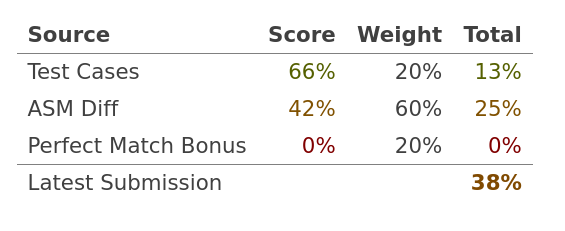
Maybe we come once back for it but for now we had enough fun. You can continue from here or check other write ups.
Conclusion
It was a really fun experience even though in comparision to other CTFs not many people attended. Or only big teams but who knows. At least we had some fun at we defenitly check out the other write ups to improve our skills. We use this more as an log book not really a write up this time but heh sharing is caring (っ ͡❛ ᆽ ͡❛)っ. Hopefully we could help a student to get some insights how the pleps went for the challenge and maybe this will become a better world.